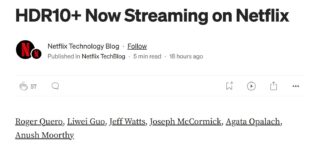For some reason I can’t explain, Molly Brown’s comment from the movie Titanic, “there’s something you don’t see every day,” (while watching the doomed ship sink), has stuck with me since I saw the movie back in 1997. It recently came to mind when a colleague informed me that HEVC support had eclipsed AV1 on the CanIUse website. You see the numbers up top, 83.39% for HEVC to 73.1% for AV1.
Until very recently, HEVC support as reported by CanIUse has been in the high teens; then Google announced support for HEVC playback in Chrome, and the support number skyrocketed. So while the turnaround was expected, it’s still quite jarring, like the Molly Brown comment. No parallel between Titanic and AV1 intended.
When I wrote an article for Streaming Media Magazine on Chrome support for HEVC, I reported that I had asked a contact at Google to connect me with someone from the Chrome group to ask about this decision. Why HEVC, and why now? Still waiting on that connection.
What I presume is that someone noticed that HEVC was the default codec in new Pixel phones, and a whole lot of other phones, and that it didn’t make sense for Google’s own browser to not easily play videos shot by Pixels (and a whole lot of other phones). Simple right? Certainly, supporting their phone-buying customers was more important than propping up a codec that’s perhaps performed well for YouTube but won’t otherwise bring in any hard revenue.
Time to Reconsider HEVC
What does this turnaround of support mean in a more general sense? HEVC got a deservedly bad rap when launched because of highly ill-conceived royalty practices, and most publishers still view the codec as if it was radioactive, dangerous, if even touched. But as attorney Robert J.L. Moore stated in the Streaming Media article, “I expect that content providers will most likely continue to enjoy the ability to implement HEVC for low or no royalties.” Instead, the vast bulk of royalties are paid by TV, computer, tablet, and phone vendors.
In the meantime, where AV1-hardware support is relatively nascent in the living room, absent in Apple-world (for now), and just starting in computers and on Android devices, HEVC plays in hardware in most premium devices manufactured in the last 3-5 years. Though Chrome’s HEVC support does have issues, like the lack of DRM support (for now), it’s time for publishers who don’t use DRM to consider taking the easy road and deploying HEVC rather than jumping through hoops to deploy AV1.
AV1 will likely have its day but in the short term, its time to give HEVC another look.
 Streaming Learning Center Where Streaming Professionals Learn to Excel
Streaming Learning Center Where Streaming Professionals Learn to Excel









